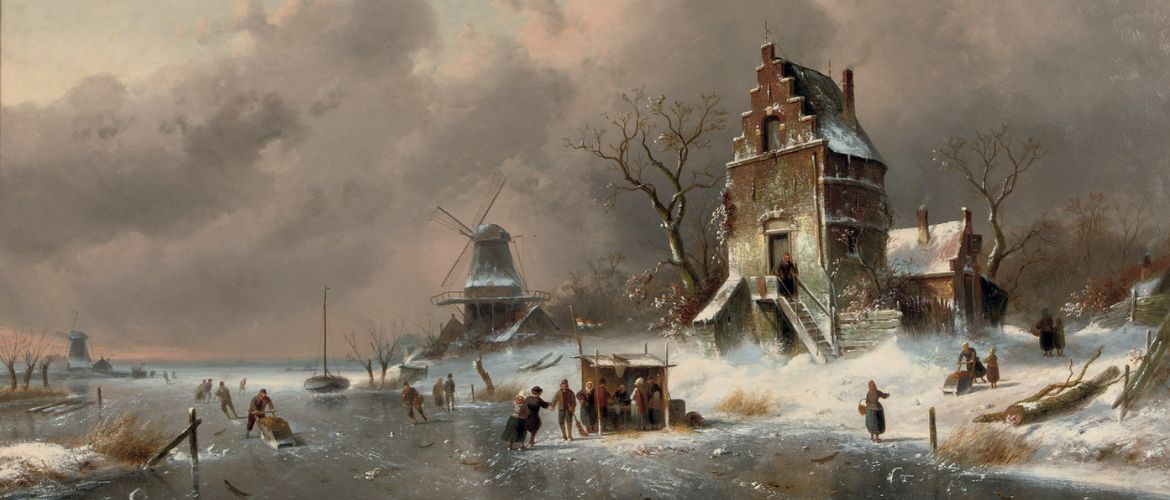“Year without summer” – 1816 refers to a three-year period of global sharp deterioration in the climate on the planet. The Germans called it “The Year of the Beggar”, and on the American continent they said “One thousand eight hundred frozen to death.” Now mentally transport yourself to those times. Imagine the state of the people. Everyone is looking forward to the end of the harsh winter, getting ready for the spring sowing season… But there is no long-awaited warmth. And then shock! It snowed in June! TV world news has not yet been transmitted, and science could not give intelligible explanations. What were people thinking? About the end of the world!

Snow fell in the USA, cold rains fell on Europe, it was gloomy, disgusting and sad. And then I got hungry.
Why did it happen?

The first explanation for the events of that year was given by climatologist William Jackson, but in 1920, 100 years after the cold summer. The scientist called the events a volcanic winter. And he saw the reason for the sharp cooling in the powerful eruption of the Tambora volcano in Indonesia on the island of Sumbawa in April 1815.
Due to the sharp drop in temperature and the disruption of weather systems, humanity around the world is faced with crop failures, epidemics, famines and unrest of catastrophic proportions. The year without summer has effectively become a three-year climate crisis. To be alive in that period meant to be hungry! Approximately this situation was in any part of the world.
Scale of the catastrophe

How do you think, how much globally did the temperature drop, that it snowed in the USA and Western Europe instead of the arrival of summer? Just 0.4–0.7°C. So, in April 1815 there was a volcanic explosion. It was a mega-colossal eruption, the most powerful in the last 10 thousand years.
Volcano Tambor threw columns of gas and ash 43 km into the stratosphere. Muddy rain was falling even at a distance of 1300 km. A large concentration of sulfate gases led to the formation of an air dust cloud of 100 cubic meters. km of garbage. This huge plume of ash and gases blotted out the sun for nearly three years.
The eruption itself took many lives, according to various sources, from 70 to 90,000 people. There were no bloggers with iPhones during these events to capture everything, but eyewitnesses heard the cannonade of explosions hundreds of kilometers from the volcano.
Tambora’s eruption was not the only reason why the decade from 1810 to 1820 was the world’s coldest in 500 years. Most likely, a little earlier there were large-scale eruptions of other volcanoes. Everything in the complex affected solar activity.
Devastating Consequences

The weather change has affected people’s lives in general. Crops died in frost and drought or were washed away by floods and snow and rain. Fruit did not ripen due to lack of sunlight and heat, and domestic livestock was destroyed due to lack of feed.
For example, Vermonters survived on hedgehogs and boiled nettles, in China they sucked on white clay, and in Eastern Switzerland the hungry ate unripe fruits, small snails, as well as leaves and brewed grass. The famine in Switzerland prompted the Russian Emperor Alexander I to allocate funds from the treasury and send grain to those in need.
When people are obsessed with how to feed themselves, then, of course, no one thinks about cleanliness and hygiene. Therefore, it is not surprising that with hunger come disease. Between 1816 and 1819, typhus and plague, cholera, broke out in various regions of Europe and the Eastern Mediterranean.
Typhoid fever comes with hunger and rages in damp, unsanitary conditions. In Ireland alone, it is estimated that 800,000 people contracted typhoid fever and over 44,000 people died from disease and starvation. In France and Britain, the disaster was eased by grain imports from Russia.
No matter how sad everything was, but the dreary summer and the ruthless darkness inspired the writer Mary Shelley to write the novel “Frankenstein”.

Like Mary Shelley, Lord Byron was able to reflect symbolically on the ill effects of the Year Without a Summer. In his poem, human sympathy fails and hearts grow cold along with the atmosphere. The “selfish prayers” of people lead to violence, chaos and pogroms in society.
Difficulties, disasters and the experiences associated with them force people to make discoveries. The chemist Justus von Liebig, who survived the famine as a child, devoted his life to the study of plants and created the first mineral fertilizers.
The lack of food for horses probably inspired the German inventor Karl Drez to develop a prototype bicycle.







Only registered users can leave comments